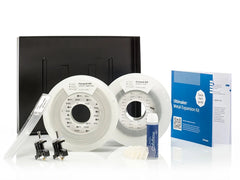- Description
- Debinding & Sintering
- Advantages Ultrafuse 316L
- Video
Ultrafuse 316L combines greater freedom of design with a low total cost of ownership. 3D-printed parts acquire their final properties, for example in terms of hardness and strength, through a debinding and sintering process developed by Forward AM, which has emerged as the industry standard. As a filament, Ultrafuse 316 L is 80% stainless steel and has a 20% polymer content which allows for easy printing on many open FFF desktop printers.
Examples of applications using Ultrafuse 316L:
- Tooling
- Jigs and fixtures
- Series production
- Functional parts and prototypes
Ultrafuse 316L is cost-effective because:
- Our filament works with any open FFF printer, which means low investment cost in hardware
- We make use of a highly efficient and established post-processing technology used in the Metal Injection Moulding (MIM) industry
- As this is a filament, material handling is much safer and very easy. This allows an easy material exchange in comparison to handling with fine metal powders
Data Sheets
Our Additive Manufacturing experts will support you from material selection, application development to the correct design diameters. Using debinding & sintering service our experts will help & guide you by speaking with you before the process starts to get the best possible outcome for your print. Quality control is major focus to us that‚„s why we will send photographs and updates to make sure you are happy with the progress once that has been passed we will send your application back to you.

- It is in general 1.4 to 2 times cheaper than most metal powders, with less investment in hardware
- There is a significant cost advantage for small and medium-sized components
- The overall manufacturing costs decrease significantly with increasing the lot size
- With additive manufacturing, you can create full stainless steel parts with a high degree of complexity












